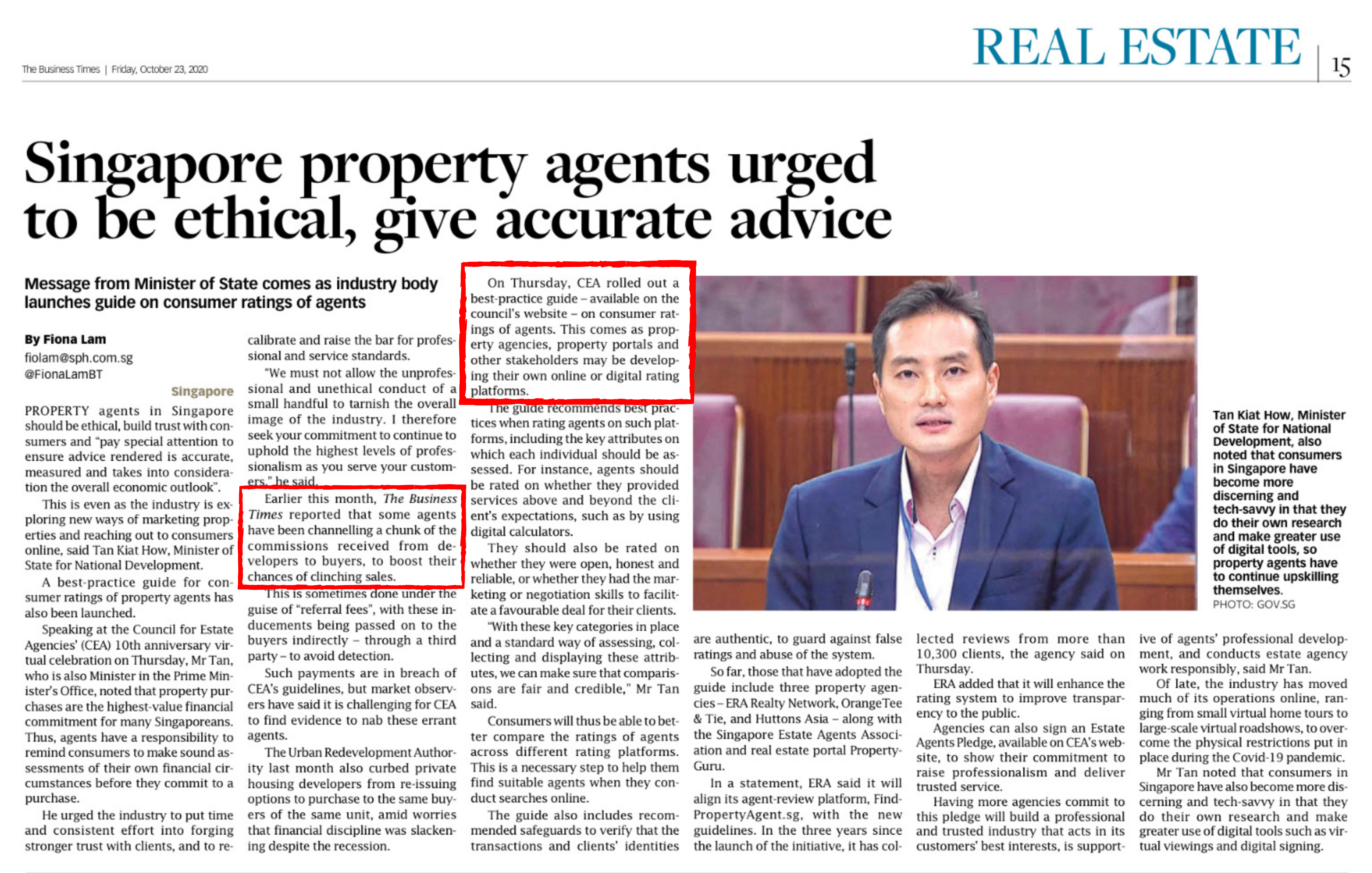
This article first appeared in Singapore’s The Business Times. I read it over several times and decided to pen down my thoughts. The article is way too biased and one-sided, offering weak solutions with no bite or purpose. The journalist is very shallow to put the blame wholly on Singapore property agents.
Kickbacks to Buyers
While there is no doubt that a number of agents are doing this to score a deal over their competitors, the reality is that many buyers are shopping for kickbacks by randomly calling up Real Estate Salespersons (RES) and offering to close a new launch purchase through them IF the said agent agrees to give back X% of the purchase price via kickbacks. These amounts could add up to as high as 70-80% of the commission amount which the salesperson is entitled to earn. The RES will have to pay income tax on the WHOLE amount even if this pushes him/her into a higher income bracket as they are unable to declare this kickback legally.
Salespersons who reject such requests by pointing out to buyers that this practice is illegal are left with no deals. In situations where an increasing number of salespersons are having difficulty in closing any deal and bringing the money home to their family, they are often left with very little choice but to accept such a bad deal – it is either the salesperson takes home a small amount or nothing. What if you were faced with such a predicament?
The few RES who have the luxury to choose to walk away from such propositions have the means to ride through slow times like this. How many are in this privileged position?
In short, the crux of the matter is down to the higher incentives being paid out to Salespersons by the developers for their hard work in getting a unit sold. This will always be an issue and will become a bigger issue as the economy continues its soft trajectory for the near foreseeable future and developers find it harder and harder to shift their unsold inventory.
I foresee developers will continue to incentivize or increase the commissions being paid out to salespersons as sales figures do not recover over the next 6-12 months or even longer. Buyers will also get bolder and bolder and ‘DEMAND’ for kickbacks.
My Thoughts:
The only way to stop the blame game is for the government to implement tough but necessary legislation. Here is what I think should be done: IMPOSE a maximum commission for closing each deal. This amount can be a fixed X% of the purchase price, applicable to all licensed or unlicensed developers who are pushing out new launches condos before reaching the CSC stage. Any bonuses or short-term incentives are also to be accounted for and not be allowed to breach the X% Limit.
There are a few advantages to this:
- Developers will then need to compete in terms of price, product differentiation, features, layouts that make them stand out in order to push sales and attract buyers. This will result in moderated GLS sale bids and/or collective sale activity which will in turn lead to a sustainable supply of new condos at any one time. This is a definite win-win to all parties except for developers.
- The public will benefit with choices based on price, features and product differentiation.
- RES will have to up their skillset to be able to serve clients based on product features and not be ‘biased’ towards selling certain developments which dangle higher incentives. Selling developments based on high commission often end up in a conflict of interest situation where the unit being sold may not be in the client’s best interests.
- The resale market will also be more lively and buoyant than now as there will not be much differentiation between selling a new launch condo and a resale condo in terms of incentives.
- RES will not hesitate to reject a buyer’s demands for kickbacks as there is really nothing much to kick back to the buyer.
- RES will not try to clinch a deal by dangling kickbacks to buyers.
The possible disadvantages are:
- Developers who won a land tender or collective sale at a high prices will end up making less profits as there is nothing much they can do to improve sales. The only thing they can do is to cut costs in order to maintain margins. This will mean developers will have to choose and bid for land wisely.
- Impose punitive punishment to Estate Agents, RES and buyers who give or receive kickbacks in either a direct or indirect method (via 3rd parties) to seal a deal.
An example would be a combination of a heavy fine equivalent to up to X times the kickback amount, a suspension and/or loss of CEA license and even jail time for the RES who is found guilty of enticing buyers via kickbacks. Kickback is no different from bribery.
For buyers who are found guilty of demanding and accepting kickbacks, they could face a combination of a very heavy fine equivalent to X times the amount of the kickback received and/or jail time as well.
For estate agents whose RES are found guilty of such practices, they could face a combination of a very heavy fine equivalent to X times the amount of kickback involved as well as suspension from operating. This will stop RES from different agencies from cannibalizing deals by dangling higher kickbacks to consumers.
I am very sure once this is put in place, anyone would think twice before acting like that.
Digital Rating Platforms
Whoever thought of this really did not do enough homework to consider the implementation process.
My Thoughts:
This will not work because the digital rating platforms aren’t based on a standardized framework of rating. It is currently left to individual agencies to administer.
Let’s be realistic about this: Which agency will put out negative reviews of their own RES? Agencies make money by taking a cut of all commissions earned by their RES. There is already an obvious conflict of interest here. Can consumers really trust the reviews on an agency’s website?
Review ratings can always be left by keyboard warriors or worse, disgruntled / upset buyers who did not get their demanded ‘kickbacks’ from the RES serving them. Likewise, it could be left by an upset Landlord / Seller / Tenant where things do not go their way in a transaction. Therefore the ratings can be very far from the truth.
In fact, a bad encounter between a RES and a consumer would not progress far enough for a transaction to happen just for the consumer to leave a feedback / review of the RES’s performance. More often than not, either party would have walked away from the transaction. If it does end up as a bad review, it’s a case of he-says-she-says. Who’s the wiser out there?
Naturally, an RES confident enough to ask for a review from a review is likely to get it due to a job well done. Then in that case, does the review really matter in the first place or does it serve its purpose?
Even if a non-related 3rd party platform was to be managed by a government agency to track all reviews, who is going to bear the cost of maintenance as well as dispute resolutions from bad reviews?
I have a better idea. Why not have a platform setup for RES to rate and review consumers / landlords / tenants or even unethical RES? It will act like a credit rating agency.
This would also be fair since RES are always in the spotlight and under review?
Is it even worth the expense and resources required in the first place? Only time will tell.

We’re here to help you on your real estate journey.
Contact us using the form on this page and our Consultant will be in touch with you very soon.
Or contact us by phone/email.
Call: (+65) 8363 2331 / 8778 8778
WhatsApp: Glynis Tan / Benjamin Yeo
Email: findout@property-science.com
